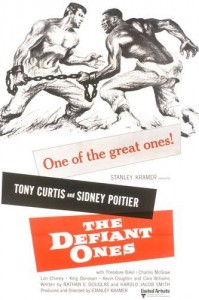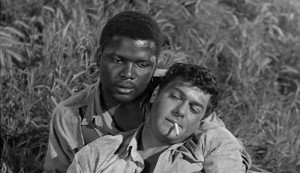
In Stanley Kramer’s best film, “The Defiant One,” two escaped convicts, one white (Tony Curtis), the other black (Sidney Poitier), make an odyssey toward freedom in the Deep South. It’s a journey that’s both physical (literally) and figurative (symbolically).
Chained to each other, the relationship between the vastly diverse men gradually changes from initially deep hatred and suspicious animosity to trustable partnership to ultimately genuine camaraderie.
Our Grade: B+ (***1/2* out of *****)
Their flight is replete with obstacles. In its course, the duo encounter a vicious lynching mob, but are saved by Big Sam (Lon Chaney), an upright and fearless man who stands up against the mob.
The film contrasts sheriff Max Muller (Theodore Bikel), a human sheriff with a streak of justice, and the brutish state policeman, who is motivated by vengeance and punishment; he wants to use his hunting dogs in the chase because to him the captives are like dogs themselves. Sheriff Muller has to remind the policeman that their job is to capture, not to execute, the convicts, and that they are there as representatives of the law.
Read our review of Kramer’s courtroom drama, Inherit the Wind
https://emanuellevy.com/wp-admin/post.php?post=6300&action=edit
Though Tony Curtis was not the first choice (Brando was) to play Joker, he gives a memorable performance that may be the best in his long career. Initially, Curtis was to get top billing, above the title, but after shooting began, Curtis asked producer-director Kramer to place Poitier’s name next to his above the title. While Curtis was more established at the time, this is the movie that made Poitier a bona fide star, entering into the most fruitful decade of his career.
Narrative Structure: Detailed Plot
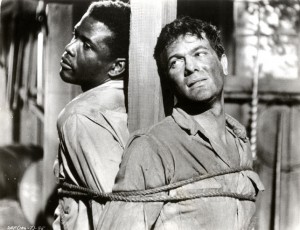 A truck driving at night swerves to prevent an accident and crashes through a barrier. The rescuers cover the people killed–mostly prisoners. Two are missing: a black man shackled to a white man. At first, the feeling is that “they will probably kill each other in the first five miles,” but a large posse and bloodhounds are dispatched to find them. The black man is Noah Cullen (Poitier) and the white John “Joker” Jackson (Curtis). Despite mutual loathing, they are forced to cooperate–if they wish to survive–but gradually, they begin to respect each other.
A truck driving at night swerves to prevent an accident and crashes through a barrier. The rescuers cover the people killed–mostly prisoners. Two are missing: a black man shackled to a white man. At first, the feeling is that “they will probably kill each other in the first five miles,” but a large posse and bloodhounds are dispatched to find them. The black man is Noah Cullen (Poitier) and the white John “Joker” Jackson (Curtis). Despite mutual loathing, they are forced to cooperate–if they wish to survive–but gradually, they begin to respect each other.
Cullen and Joker flee through difficult terrain and weather, with a brief stop at a turpentine camp. They break into a general store for food and tools, but they are captured by the inhabitants who form a lynch mob. They are saved only by one man, “Big” Sam (Chaney), who’s appalled by his neighbors’ brutality. Sam promises to lock the convicts up and turn them in the morning, but he secretly releases them, after revealing that he too is a former chain-gang prisoner.
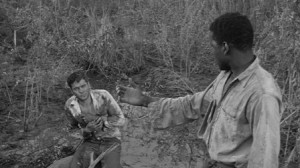 Spotted by a young boy, Billy, they make him take them to his home and his single mother (Williams); her husband had abandoned her. The escapees are finally able to break their chains. The lonely woman is attracted to Joker and wants to run off with him. She advises Cullen to go through the swamp to reach the railroad tracks, while she and Joker drive off in her car. The men agree to split up, but Cullen leaves, she reveals that she had lied. She had sent Cullen into the swamp to die so that, if captured, he won’t reveal where Joker had gone. Joker runs after his friend, but as he leaves, Billy shoots him.
Spotted by a young boy, Billy, they make him take them to his home and his single mother (Williams); her husband had abandoned her. The escapees are finally able to break their chains. The lonely woman is attracted to Joker and wants to run off with him. She advises Cullen to go through the swamp to reach the railroad tracks, while she and Joker drive off in her car. The men agree to split up, but Cullen leaves, she reveals that she had lied. She had sent Cullen into the swamp to die so that, if captured, he won’t reveal where Joker had gone. Joker runs after his friend, but as he leaves, Billy shoots him.
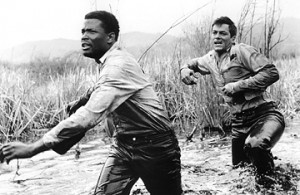 Wounded, Joker catches up to Cullen and warns him about the swamp. The posse led by humane Sheriff Max Muller (Bikel) gets so close that they can hear the dogs on their trail. But they also hear a train whistle and run towards the sound. Cullen hops the train but he is unable to drag Joker aboard, and they tumble to the ground.
Wounded, Joker catches up to Cullen and warns him about the swamp. The posse led by humane Sheriff Max Muller (Bikel) gets so close that they can hear the dogs on their trail. But they also hear a train whistle and run towards the sound. Cullen hops the train but he is unable to drag Joker aboard, and they tumble to the ground.
Too exhausted to run, all they can do is sit and wait for their arrest. When the sheriff arrives, he finds Cullen singing while holding Joker in his arms.
Kramer is the kind of filmmaker who had never developed as a director, but here he shows skills for getting powerful performances from his two leads and supporting cast, manifest in four acting nominations. This is the only Oscar nomination of Tony Curtis. Poitier, displaying remarkable restraint and compassion, would win the Best Actor Oscar in 1963 for Lilies of the Field.
Theodore Bikel deserves a special mention for playing convincingly a sheriff with a streak of mercy and justice, values he has to defend and fight for against the brutish racist state policeman (Charles McGraw).
The film was moderately successful in the U.S., but did not play well overseas. Made on a budget of $0.8 million, The Defiant Ones earned $2.5 million in domestic rentals.
Oscar Context
Oscar Nominations: 9
Picture, produced by Stanley Kramer
Director: Stanley Kramer
Actor: Tony Curtis
Actor: Sidney Poitier
Supporting Actor: Theodore Bikel
Supporting Actress: Cara Williams
Story and Screenplay (Original): Nedrick Young and Harold Jacob Smith
Cinematography (b/w): Sam Leavitt
Editing: Frederick Knudson
Oscar Awards: 2
Story and Screenplay
Cinematography
Cast
John Jackson (Tony Curtis)
Noah Cullen (Sidney Poitier)
Sheriff Max Muller (Theodore Bikel)
Captain Frank Gibbons (Charles McGraw)
Big Sam (Lon Chaney Jr.)
Solly (King Donovan)
Mac (Claude Akins)
Editor (Lawrence Dobkin)
Lou Gans (Whit Bissell)
The Woman (Cara Williams)
Black-and-white
Running time: 97 Minutes
When the film was first released, Bosley Crowther, film critic for The New York Times, lauded the production and the acting in the film, writing, “A remarkably apt and dramatic visualization of a social idea—the idea of men of different races brought together to face misfortune in a bond of brotherhood—is achieved by producer Stanley Kramer in his new film, The Defiant Ones… Between the two principal performers there isn’t much room for a choice. Mr. Poitier stands out as the Negro convict and Mr. Curtis is surprisingly good. Both men are intensely dynamic. Mr. Poitier shows a deep and powerful strain of underlying compassion…In the ranks of the pursuers,
Variety magazine likewise praised the acting and discussed the film’s major theme, writing, “The theme of The Defiant Ones is that what keeps men apart is their lack of knowledge of one another. With that knowledge comes respect, and with respect comradeship and even love. This thesis is exercised in terms of a colored and a white man, both convicts chained together as they make their break for freedom from a Southern prison gang. The performances by Tony Curtis and Sidney Poitier are virtually flawless. Poitier captures all of the moody violence of the convict, serving time because he assaulted a white man who had insulted him. It is a cunning, totally intelligent portrayal that rings powerfully true…Curtis delivers a true surprise performance. He starts off as a sneering, brutal character, willing to fight it out to-the-death with his equally stubborn companion. When, in the end, he sacrifices a dash for freedom to save Poitier, by saving him from the swamp, he has managed the transition with such skill that sympathy is completely with him.”
